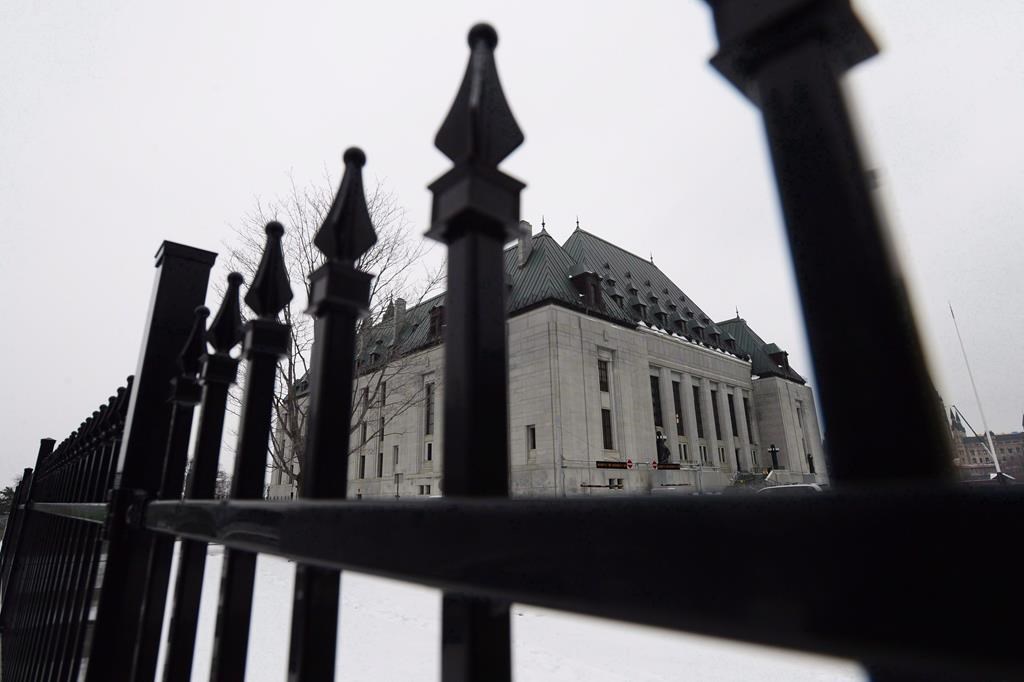OTTAWA — Making an accused person wait in jail before trial should be the exception, not the rule, the Supreme Court of Canada says in a decision that affirms a key legal safeguard intended to ensure speedy justice.

In a 9-0 ruling Thursday, the high court said people accused of crimes are automatically entitled to a review of their detention under specific provisions of the Criminal Code.
In clarifying how the provisions should work, the court said Parliament wanted to make certain that people awaiting trial have their cases looked at by a judge at set points in time to consider whether keeping them in jail is justified.
WATCH: N.S. man who served 17 years for murder acquitted of charge

The decision means jailers must apply to a judge for a hearing on behalf of the accused at the 30-day mark in cases involving lesser offences, and at the 90-day mark in cases involving indictable offences.
The ruling comes three years after the Supreme Court set out a groundbreaking new framework for determining whether a criminal trial has been unreasonably delayed in the drug case of Barrett Richard Jordan.
“Delays in routine bail and detention matters are a manifestation of the culture of complacency denounced by this Court in Jordan, and must be addressed,” Chief Justice Richard Wagner wrote on behalf of the court in Thursday’s decision.

Get breaking National news
The case landed at the high court as a result of an appeal by Corey Lee James Myers, who was arrested on several firearms charges in British Columbia three years ago.
WATCH: Victim surcharges struck down by Supreme Court of Canada

Though Myers eventually pleaded guilty to reduced charges, he also challenged a decision to keep him in custody pending trial.
At issue was section 525 of the Criminal Code, which outlines procedures for detention review hearings aimed at preventing accused people from languishing in jail before trial.
Although Myers’ appeal is now moot, the Supreme Court exercised its discretion to examine the case because practices concerning these detention review hearings vary widely across the country with regard to when they happen, whether they are mandatory and factors to be considered.
In the decision, Wagner wrote that the right to liberty and the presumption of innocence are fundamental tenets of the criminal justice system.
WATCH: Feds don’t have to consult with Indigenous peoples when making new laws, Supreme Court of Canada rules

“In the pre-trial context, release — at the earliest opportunity and in the least onerous manner — is the default presumption in Canadian criminal law. Pre-trial detention is the exception, not the rule.”
Being detained prior to trial can have “serious detrimental impacts” on the accused person’s ability to mount a defence and comes at a significant cost to liberty, mental and physical well-being, family life and employment, Wagner wrote.
However, a significant number of people await trial behind bars at any given time in Canada, he noted. In some cases, accused people are held in provincial jails — often in dire, overcrowded conditions — for the entire length of the pre-trial process, which can amount to hundreds of days in custody, he added.
Wagner said that upon receiving an s. 525 application from a jailer (or, in some provinces, the prosecutor) after a 30-day or 90-day period, the judge must fix a date for the hearing, to be held at the earliest opportunity.
During the hearing, the judge may refer to the transcript, exhibits and reasons from any previous detention review hearing and parties may make submissions based on credible information relevant to the judge’s analysis.
WATCH: Canada’s ‘free the beer’ case loses in Supreme Court

Ultimately, the reviewing judge must give reasons why the “measure of last resort” — keeping the person locked up — is, or is not, justified, Wagner wrote.
Continued detention may be warranted to ensure the accused shows up in court, to protect the public or to maintain confidence in the administration of justice.
S. 525 hearings take on “a heightened importance in the post-Jordan era” because they allow a judge to evaluate the progress of a trial at an early stage and prevent unreasonable delay, Wagner said.
The judge should always determine whether it presents an appropriate occasion to exercise his or her discretion to give directions for expediting the trial and related proceedings, he added.
- Teen who desperately needed size 23 shoes now holds 2 world records
- Canada abstains from UN motion calling on Israel to end presence of Gaza, West Bank
- U.S. sues owner of ship that caused Baltimore bridge collapse for US$100M
- Iranian hackers tried to send stolen Trump info to Biden campaign, FBI says







Comments